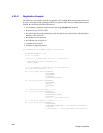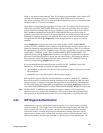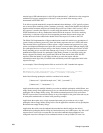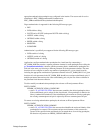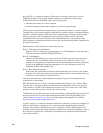288
Dialogic Corporation
The elements of the authentication quadruplets are contained in an IP_AUTHENTICATION data
structure, with each element having the following characteristics:
realm
a case-insensitive string that defines the protected domain name. This element must always
contain a non-empty string.
identity
for a single-user realm, an empty string
for a multi-user realm, either a case-insensitive string that identifies the user in the given realm,
or else an empty string to allow specification of a default username/password pair. Non-empty
strings must conform to the conventions for a SIP URI, and must begin with a “sip:” or “sips:”
scheme
username
a case-sensitive, null-terminated string that is the user’s name. This element must always
contain a non-empty string when configuring an authentication quadruplet. This value of this
structure element is ignored when removing an authentication quadruplet.
password
a case-sensitive, null-terminated string that is the user’s secret password in clear text. This
element can optionally be an empty string, for example, if the quadruplet contains an
anonymous username. This value of this structure element is ignored when removing an
authentication quadruplet.
When preparing to configure a quadruplet, the application should begin by initializing the
IP_AUTHORIZATION structure with the INIT_IP_AUTHORIZATION( ) function, which
configures the structure with the correct version number and with NULL string pointers for each
element. The application should then populate each element with the desired string, including any
empty strings. If any of the elements is left with a NULL pointer when passed to the function, the
function call fails with IPERR_BAD_PARM.
Note that the gc_SetConfigData( ) and gc_SetUserInfo( ) functions cannot be used to configure
authentication quadruplets. If a GC_PARM_BLK containing either of the authentication parameter
IDs is passed to either of those functions, the function call fails with IPERR_BAD_PARM.
4.24 Using SIP Transport Layer Security (TLS)
The Dialogic
®
Global Call API library supports SIP Transport Layer Security (TLS), which is a
security mechanism that operates on the Transport layer, on top of TCP transport. By using TLS as
the connection transport, a SIP entity can send and receive SIP messages in a secure, authenticated
manner.
The Global Call implementation of TLS is described in the following topics:
• Overview of TLS
• Configuring and Enabling TLS
• Making Calls Using TLS
• TLS Transport Failures



